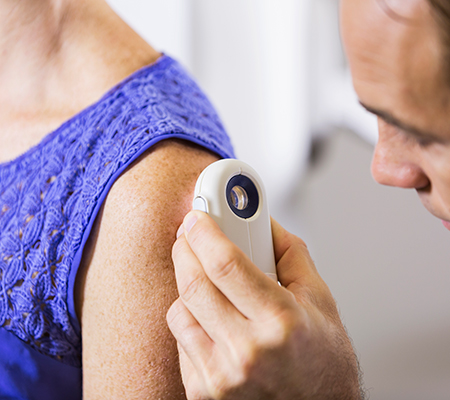
If you are concerned about a weird spot on your skin, talk to your doctor.
“Is this weird looking spot on my skin a skin cancer?”
That is a question that Dr. Rohit Sharma, a Marshfield Clinic Health System surgical oncologist is asked a lot since he has a special interest in cancers of skin and other connective tissues.
Sharma informs his patients that the lesions to be concerned about include any changing or persistent area that is present for more than two weeks, and has any of the following features:
- An ulcer
- An unexplained bruise
- A mass
- An area where there is more or less pigmentation than the surrounding areas
Next steps after finding a weird spot on your skin
Start by seeking medical advice. You should especially be concerned if the weird spot on your skin begins to:
- Itch
- Bleed
- Cause the skin to break down
You also should look for similar spots in other areas. “If there is one spot that is changing, it is actually more suspicious than multiple areas changing. If multiple areas are changing, it is most likely a rash,” Sharma said.
Most other skin conditions go away after several weeks, he said. “Skin cancer instead will persist and/or get worse – it will itch more, bleed more or get bigger.”
To help monitor if a spot is changing over time, Sharma suggests taking periodic pictures of the spot, and comparing it over time, to see if it changes. He warns that some of the changes to watch for can be other skin conditions.
What to tell you doctor
If you are worried about weird spots on your skin, talk to your doctor.
“If there is clinical suspicion based on your history and physical exam, then a biopsy is a proper way to diagnose skin cancer,” Sharma said.
When you see a doctor, be prepared to answer some common questions that you will likely be asked including:
- When did the lesion appear?
- How long has it been there?
- Has it progressed?
- Were there any issues or trauma that led to the lesion?
- Have you had skin cancer before?
For more information about skin cancer, talk to your doctor.


That is a very good tip particularly to those fresh to the blogosphere. Short but very precise info… Appreciate your sharing this one. A must read post!
My son has a circular spot on his cheek that is white in color and has been there for several weeks now. It has an almost scaly feel to it and I noticed yesterday that it had a pinkish/reddish hue to the center. There are not any other spots present. Should I be concerned?
Hi, Katie. Thank you for reaching out and reading Shine365.
We cannot give individualized medical advice on our blog. Your child's pediatrician is the best person to help you answer this question. He/she knows your son's medical history and current conditions best. If you are a Marshfield Clinic patient, you can directly message this question to your son's care team via My Marshfield Clinic: https://www.marshfieldclinic.org/mymarshfieldclinic.
Based on your question, you may find these Shine365 stories helpful, too:
What's happening to my baby's skin? – https://shine365.marshfieldclinic.org/kids-health/eczema-in-children/
Control persistent rashes with the right diagnosis – https://shine365.marshfieldclinic.org/wellness/eczema-and-psoriasis/
Let your kids soak up the suds: https://shine365.marshfieldclinic.org/kids-health/giving-kids-baths/
-Kirstie